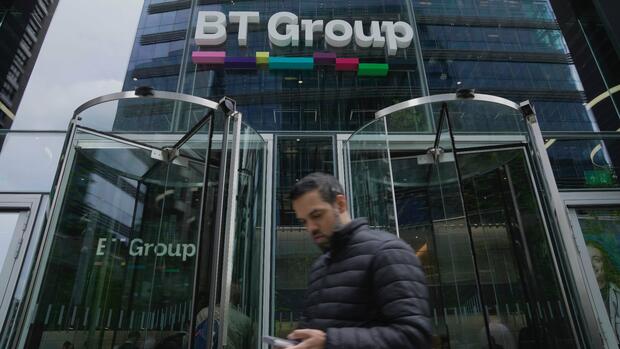Hamburg, New York Mathias Döpfner is considered a big fan of artificial intelligence (AI). The head of the Axel Springer media group is certain that it will revolutionize journalism and free reporters from tiresome tasks. Philip Jansen, CEO of British Telecom (BT), recently argued in a similarly hopeful manner. According to Jansen, his company will be a “massive beneficiary” of AI.
Döpfner and Jansen also presented a few ideas as to how they imagine the “impact” of the new technology. In the future, AI tools would design entire newspapers or answer calls to the service hotline. In concrete terms, both are not yet possible in the required quality without human intervention.
However, the two managers quantified the consequences for the employees very precisely: Jansen wants to lay off over 55,000 people at BT by 2030, a whopping 43 percent of the workforce. Supposedly, thanks to the AI revolution, a large part of it is no longer needed.
Döpfner is cutting more than 200 jobs at the “Bild” newspaper alone. Internally, the Springer management packaged the savings measure euphoniously as an “AI offensive”.
There is a system to this: Austerity measures, which are often based on strategically wrong decisions in the past, can currently be sold as progressive with just two letters. Thanks AI. Even technology groups like IBM, which wants to lay off 7,800 people, are taking advantage of the communicative slipstream of the AI boom.
Transfiguration of AI technology: excesses like Metaverse and cryptocurrencies
Indeed, the impact of AI technologies on most industries will be immense. Tasks change and many will be eliminated. However, the concrete effects are often far from being as clear as corporate leaders like Jansen would like us to believe. By apologizing for job cuts using AI, CEOs are amplifying people’s often irrational fears of technology.
What is fatal is that the capital market rewards such behavior with price increases. On the stock exchange, technology trends such as AI are intellectually gutted and reduced to their hype potential. This sometimes leads to exaggerations. Good corporate leaders should not be carried away by this.
An AI is to layout the Bild newspaper in the future.
(Photo: dpa)
In the Buzzword Pig Cycle, the transfiguration of AI technology is at its peak. In terms of magnitude, the rhetorical AI bubble in many companies already surpasses recent excesses around the metaverse, augmented reality and cryptocurrencies.
So far, little has happened in depth in many companies when it comes to AI. This is the second danger that accompanies the communicative misuse of technology revolutions. Corporations in particular then tend to simply pass on external innovation shocks instead of processing them.
More about artificial intelligence
This is also the case with the AI effect: Management consultancies are commissioned, special representatives appointed, strategy papers written and, in the end, the cleaning team itself asked for input for the task force. With such an approach, you can quickly present yourself as an early adopter in the analyst call or in conference small talk. Currently ideally garnished with a bizarre answer that a ChatGPT recently proffered, because that ticks two boxes: technological competence plus the ability to reflect.
This innovation choreography was practiced alarmingly well in many management circles at the latest with the smartphone revolution. Due to the ever shorter innovation cycles, the need to work off technological breakthroughs in a ritualized manner is apparently increasing. Pilgrimages to Silicon Valley are currently increasing again. Board members at Deutsche Telekom proudly reported in the spring that they briefly greeted OpenAI boss Sam Altman.
Hot air and a waste of money when it comes to AI
So when it comes to AI, a lot of hot air is emitted in addition to cold sweat. This is also due to the cynical cost logic that governs many boards. Companies that already have a bad reputation when it comes to customer service, for example, should be careful about prematurely praising ChatGPT-powered service bots. Even AI cannot work miracles on a dilapidated and fragmented IT infrastructure such as that at Lufthansa. In many places, only high investments would make savings through AI possible in the first place.
Sometimes money is simply wasted in such phases. Or do you still remember Dekabank’s Metaverse appearance in “Decentraland”?
This text is part of the large Handelsblatt special on artificial intelligence. Are you interested in this topic? All texts that have already appeared as part of our theme week
You will find here.
Even real AI professionals apparently cannot escape the communicative temptation. Group insiders at IBM see the announcement of the AI-related job cuts as a sign of a large-scale PR strategy in order to be perceived as innovative again. It was probably not for nothing that CEO Arvind Krishna issued his warning exactly eight days before the most important product launch of the year: Watsonx, IBM’s revised AI platform.
With this, the tech veteran is finally trying to get on the offensive. After all, IBM helped kick off the AI hype: in 2011, IBM’s own development Watson won the country’s most popular quiz show, “Jeopardy”, against a human. For a brief moment, it seemed as if the group were even the world market leader in AI.
>> Read also: Where’s Watson? How IBM took the lead in AI – and lost it again
In the years that followed, however, the management made one wrong decision after another, including the marketing of Watson Health for the healthcare sector – a product that made a name for itself with dangerous to incorrect treatment recommendations.
Everything will be better with Watsonx, Krishna promised. “With IBM Watsonx, customers can quickly train individual AI capabilities across their entire enterprise,” he announced.
A loud discussion about the consequences of AI for the labor market, it was said in corporate circles, could certainly not harm marketing success.
More: The Frankenstein Moment – If we don’t control artificial intelligence, it controls us
